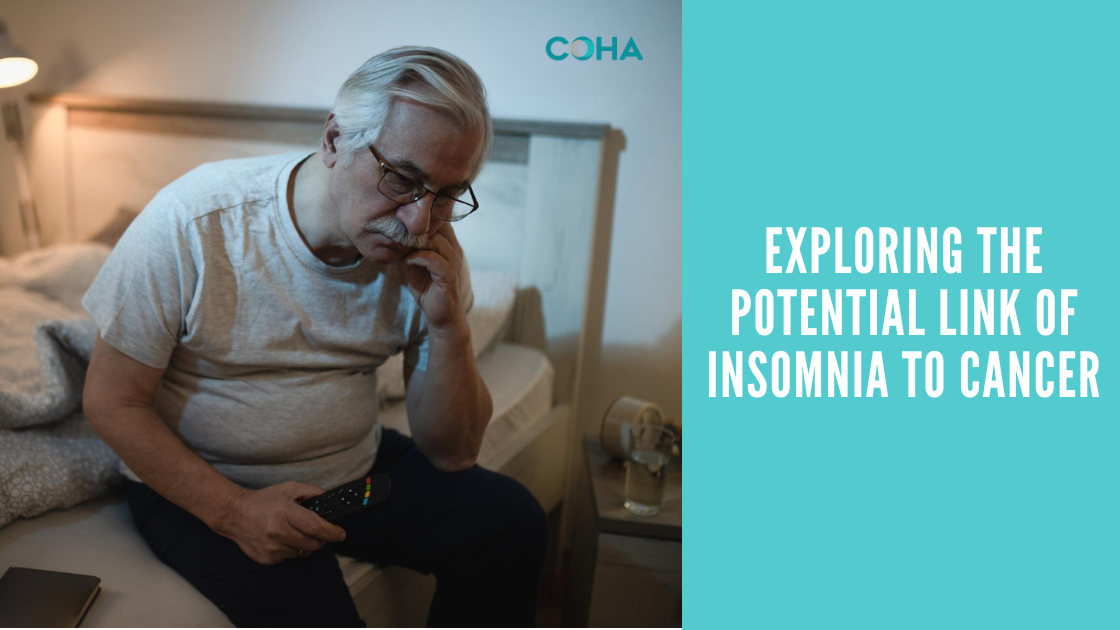The relationship between insomnia and cancer is a complex and multifaceted topic that has been the subject of many scientific investigations. Sleep deprivation over time may increase the risk of some malignancies. However, sleep and cancer are linked in other ways. Getting a decent night's sleep after cancer treatment is complex and may be a lifelong difficulty for survivors.
According to NIH, insomnia is common among people who are being treated for cancer. Let's learn more about insomnia and cancer.
Can a Lack of Sleep Cause Cancer?
Cancer and sleeplessness have been a topic of debate for some time. There is evidence that several aspects of sleep, such as sleep length, sleep quality, circadian rhythm, and sleep disorders, might influence cancer risk. However, research in this area is not always consistent or conclusive, which may reflect problems in collecting good data regarding sleep across time.
How Can Sleep Affect Cancer Growth?
Here are some ways in which sleep may influence cancer growth:
- Circadian Rhythms: Disruptions to circadian rhythms, the body's internal clock that regulates various physiological processes, including sleep-wake cycles, may contribute to cancer growth. Circadian rhythm disturbances can affect the timing of cell division, DNA repair, and other essential processes.
- Melatonin Production: Melatonin, a hormone produced during sleep, has antioxidant and anti-inflammatory properties. It is believed to regulate the sleep-wake cycle and influence various cellular processes, potentially impacting cancer growth. Reduced melatonin production due to insufficient sleep or exposure to light at night may contribute to an environment conducive to cancer development.
- Immune System Function: Sleep is essential for a well-functioning immune system. During sleep, the immune system identifies and eliminates abnormal cells, including potentially cancerous cells. Chronic sleep deprivation may compromise immune function, potentially allowing cancer cells to evade detection and clearance.
- Inflammation: Lack of sleep has been associated with increased levels of inflammation in the body. Chronic inflammation is implicated in the development and progression of cancer. Inflammatory processes may create an environment that supports the survival and growth of cancer cells.
What Are the Causes of Insomnia in People with Cancer?
Insomnia in cancer patients can have a variety of causes, including a mix of medical, psychological, and environmental problems. Here are some causes of cancer insomnia:
- Treatment Side Effects: Cancer treatments such as chemotherapy, radiation therapy, and immunotherapy can lead to various side effects that disrupt sleep. These may include nausea, pain, hot flashes, or changes in hormonal levels.
- Pain: Cancer or its treatments may cause pain, interfering with sleep. Pain can make it challenging to find a comfortable position and maintain restful sleep.
- Anxiety and Depression: A cancer diagnosis and the associated uncertainties can lead to heightened levels of anxiety and depression. Emotional distress can contribute to difficulty falling asleep or staying asleep.
- Changes in Sleep Patterns: Hospitalization, changes in daily routines, and disruptions to standard sleep patterns can contribute to sleep disturbances. Inconsistent sleep schedules may affect the body's natural circadian rhythms.
- Hormonal Changes: Cancer and its treatments can lead to hormonal changes in the body, such as alterations in cortisol levels. Hormonal imbalances may impact the sleep-wake cycle.
How to Improve Sleep and Cope with Cancer?
Improving sleep and coping with cancer often involve a combination of medical, behavioral, and lifestyle strategies. Here are some common tips to improve sleep in cancer patients:
- Create a Relaxing Bedtime Routine: Establish a calming pre-sleep routine to signal the body that it's time to wind down. It may include reading a book, taking a warm bath, or practicing relaxation exercises.
- Maintain a Consistent Sleep Schedule: Try to go to bed and wake up simultaneously every day, even on weekends. Consistency helps regulate the body's internal clock and promotes better sleep.
- Create a Comfortable Sleep Environment: Ensure the sleep environment is restful. Keep the bedroom cool, dark, and quiet.
- Limit Screen Time Before Bed: Reduce exposure to screens at least an hour before bedtime. The blue light emitted from screens can interfere with the production of the sleep hormone melatonin.
- Manage Pain and Discomfort: Communicate with the healthcare team about any pain or discomfort. Proper pain management can significantly improve sleep quality.
Cancer Survivorship and Sleep
Cancer survivorship is a period that begins at the time of cancer diagnosis and continues throughout the rest of the survivor's life. The physical and mental impacts of cancer and cancer treatment can be long-lasting, posing a variety of issues for cancer survivors.
For cancer survivors, sleep can be a crucial aspect of overall well-being, and managing sleep-related challenges is essential. Cancer survivors should consult with their doctor about developing a wellness plan that addresses not just sleep but also other critical health issues such as food, exercise, and follow-up treatment. This strategy can contain strategies for optimal sleep hygiene to support healthy sleeping habits.
Get the Best Treatment for Insomnia during Cancer with Us
Chesapeake Oncology Hematology Associates offers cancer patients with continuous support and world-class care. Don't be afraid to seek the compassionate aid and qualified guidance you require in your struggle against insomnia and cancer from our seasoned healthcare specialists. Contact us today to get started.


